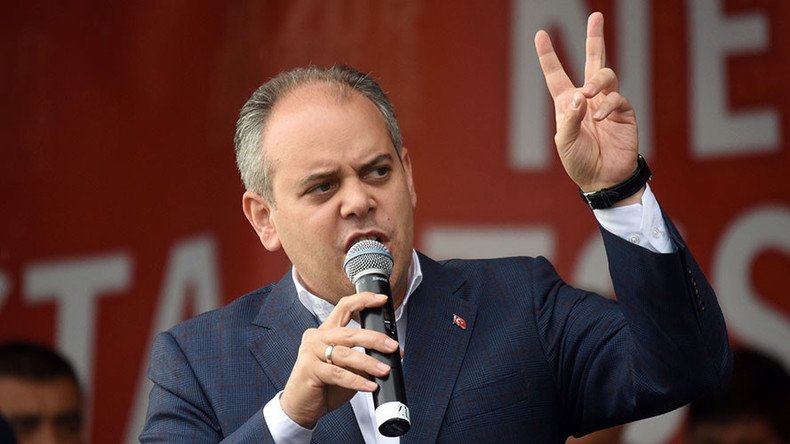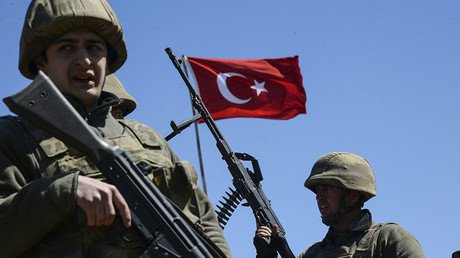Ankara seizes Deutsche Welle footage containing interview with Turkish minister

The Turkish government has seized a Deutsche Welle tape containing an interview with its youth and sports minister. The German media outlet has called the move a “blatant violation of press freedom.”
When Deutsche Welle reporter Michel Friedman traveled to Ankara to meet with Akif Cagatay Kilic on Monday, he asked the youth and sports minister about topics ranging from July’s attempted coup and subsequent arrests, massive layoffs, the country’s media situation, and the position of women in Turkey.
Although Friedman expected to be able to keep the interview tape, which was scheduled to air on a program called “Conflict Zone,” the journalist and his crew were told they couldn’t leave the Ministry for Youth and Sport until the video had been turned over.
A statement from Kilic’s press officer, Übeydullah Yener, said the interview tape was taken because Friedman asked questions that had not been previously cleared.
“There was no authorization for the interview. The questions asked were not the ones that were planned. Mr. Friedman himself knows exactly why this happened. Some statements were right out allegations. In such a situation, there was no authorization granted,” Yener told Deutsche Welle’s Turkish language department.
The ministry later explained its position in a post on its website, in which it blamed Deutsche Well for the unpleasant incident, claiming that Friedman had “overstepped the mark with expressions and accusations.” It also maintained that the move to take the video had been in line with a policy stipulating that interviews require “authorization,” which also exists in Germany.
An official from the ministry also denied that the footage had been “confiscated,” telling AP that “no force” had been used and that the outlet had turned over the video after agreeing to a request not to air the interview.
Monday’s row has prompted the director general of Deutsche Welle, Peter Limbourg, to speak out against Ankara.
“What we are experiencing constitutes an act of the Turkish regime’s coercion,” Limbourg said. “It cannot be that a minister willingly responds to an interview and then tries to block the transmission in such a manner just because he did not like the questions posed.”
Immediately following the incident, Deutsche Welle appealed to the Turkish ministry of youth and sports, as well as to the Turkish directorate-general for press and information, demanding that the video by released. A deadline set for Tuesday at noon passed without any response, however.
There have also been several phone calls between the German media outlet and ministry representatives, who continue to insist that the Ministry for Youth and Sport will not agree to the interview being broadcast.
Ankara’s confiscation of the tape has prompted many outraged Germans to take to social media, including Greens politician Cem Özdemir, who tweeted: “Is the government going to allow the public service broadcaster to be bullied in Turkey?”
Lässt #BuReg es zu, dass nun öffentl-rechtl Sender in #Türkei drangsaliert wird? #dw#friedman@deutschewelle@djvdehttps://t.co/2KUws111d8
— Cem Özdemir (@cem_oezdemir) September 6, 2016
The ex-editor-in chief of Turkey’s Cumhuriyet newspaper, Can Dündar – who was jailed along with a colleague in 2016 after the paper published a report alleging that Turkish government trucks were transporting weapons to rebels in Syria – was seemingly unsurprised by Ankara’s move, tweeting “Welcome to Turkey, folks!” with a link to the story.
Welcome to Turkey folks!@dw_deutsch@dw_global@dw_turkce@dw_conflictzone@DeutscheWellehttps://t.co/YYYHrPVsdm
— Can Dündar (@candundaradasi) September 6, 2016
The German Journalist Union also took to social media, tweeting: “We demand an immediate release of the interview. The federal Foreign Office must take action.”
Wir fordern eine sofortige Freigabe des Interviews - @AuswaertigesAmt muss handeln! https://t.co/ElIcmI7hDr#Türkeihttps://t.co/WBovQUCoe7
— Journalisten-Verband (@DJVde) September 6, 2016
The German government tried to downplay the incident, saying Berlin’s ambassador to Ankara had held "good and constructive" talks with the Turkish minister’s office and they had decided the incident should not increase tensions.
"[The ambassador] made clear that for us, for him, for the German government and German media, press freedom is very important," a spokesman for the Foreign Ministry said on Wednesday.
This latest scandal comes just months after Ankara submitted a formal complaint against German comedian Jan Böhmermann in April, which called for him to be prosecuted for writing a satirical poem about Erdogan that was aired on German television in March.
While Chancellor Angela Merkel maintained that the Germany’s constitution allows for freedom of opinion and art, she eventually allowed the suit to go through when pressed by Turkey, saying that the issue was a matter for public prosecutors and courts, rather than governments.
Erdogan eventually dropped the lawsuit, along with a number of other suits that had been filed against those accused of insulting him.
Turkey’s media crackdown
Turkey’s stance on press freedom has come under scrutiny in recent months. Dozens of arrest warrants were issued for journalist following the failed coup in July, with many put behind bars. Many of the journalists were from Zaman, a newspaper that Erdogan referred to as the “flagship media organization” of alleged coup mastermind Fethullah Gulen. The paper was seized by the Turkish government in March.
In June, Turkish authorities detained and charged two journalists and an academic with spreading “terror propaganda” after the group took part in a solidarity campaign supporting a pro-Kurdish publication.
In April, Turkey refused entry to German TV journalist Volker Schwenck, who was on his way to the Turkish-Syrian border to report on refugees. Around the same time, Dutch-Turkish journalist Ebru Umar was briefly detained for tweeting critical comments. Prominent Turkish journalist Hamza Aktan was also detained and questioned for pro-Kurdish tweets that he posted and reposted in 2015.
Meanwhile, the relationship between Germany and Turkey remains tense. That tension was exacerbated after German authorities failed to allow Erdogan to speak to his supporters at a Cologne rally in July via video link, as well as a symbolic resolution Germany made declaring that the 1915 massacre of Armenians by Ottoman Turkish forces had been “genocide.”













